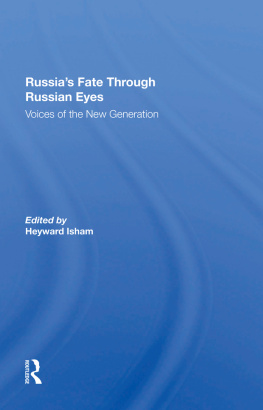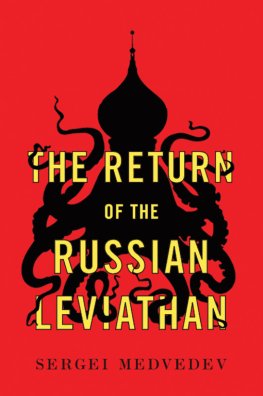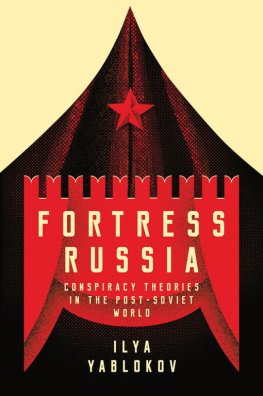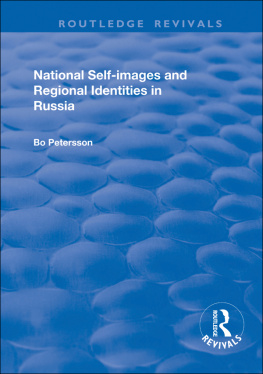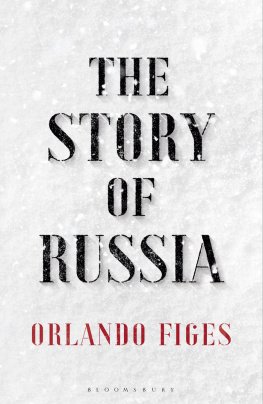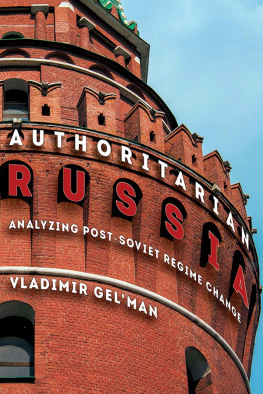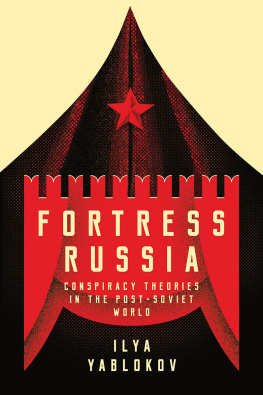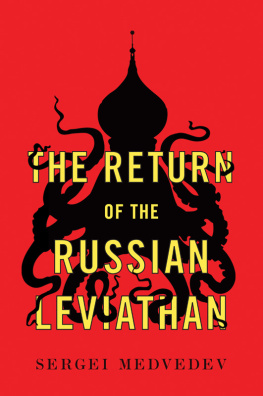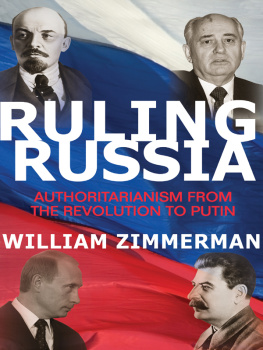First published 2001 by Westview Press
Published 2019 by Routledge
52 Vanderbilt Avenue, New York, NY 10017
2 Park Square, Milton Park, Abingdon, Oxon OX14 4RN
Routledge is an imprint of the Taylor & Francis Group, an informa business
Copyright 2001 by Taylor & Francis
All rights reserved. No part of this book may be reprinted or reproduced or utilised in any form or by any electronic, mechanical, or other means, now known or hereafter invented, including photocopying and recording, or in any information storage or retrieval system, without permission in writing from the publishers.
Notice:
Product or corporate names may be trademarks or registered trademarks, and are used only for identification and explanation without intent to infringe.
Library of Congress Cataloging-in-Publication Data
Russia's fate through Russian eyes / edited by Heyward Isham; with Natan M. Shklyar;
with an introduction by Jack F. Matlock Jr.
p. cm.
Includes index.
ISBN 0-8133-3866-2
1. Russia (Federation)Politics and government1991- . 2. Russia
(Federation)Economic conditions1991- . 3. Russia (Federation)Social
conditions1991- . 4. Russia (Federation)Intellectual life1991- . I. Isham,
Heyward.II. Shklyar, Natan M. III. Matlock, Jack F.
DK510.763 .R872 2000
947.086dc21
00-046224
ISBN 13: 978-0-367-28650-7 (hbk)
Dedicated to the memory of Dmitry Sergeevich Likbachev (1906-1999), intrepid investigator of the Old Russian literary heritage from the tenth to the seventeenth century and a source of inspiration and wise counsel to the new generation of Russian leaders of all ages. "Our future lies in openness to the entire world and in enlightenment."
The young Russian men and women who record in these pages the hopes, fears, triumphs, and tragedies their country has undergone in recent yearsaltering their own lives profoundly in the processall come from the first post-Soviet generation to achieve positions of leadership in Russia. They report on five challenges central to Russia's survival and stabilization: reshaping the state, coping with new economic rules, striving toward the rule of law, building a civil society, and preserving the national culture and educational capacity.
They love their country, while understanding all too well the crippling psychological legacy of seventy years of a dictatorship that was both cunning and cruel in dispensing a plausible Utopian myth and exacting extraordinary sacrifices in the name of that myth. They understand the acute sense of disorientation that overcame all generations when the USSR abruptly dissolved in 1991 and the Communist Party simultaneously lost much, if not all, of its power. As several of our authors recall, it was like waking up one morning and finding yourself a citizen of an entirely different country, meanwhile discovering that your parents were not your real parents and that you had acquired a brand new surname.
But these young Russians waste no time in historical retrospectives. Unencumbered by fears of either a Communist restoration or a right-wing coup, they have no taste for recrimination or resentment: They go about their business briskly, boldly. From the voices caught in these pages we learn what the young generation of Russians are doing to help their country recover from its precipitous decline, and how they see the future. For example:
- a grain dealer deftly navigates the newly demonopolized commodities market and competes on the world market;
- a real estate developer, responding to pent-up demand, builds functional and affordable housing in the Moscow suburbs;
- an opponent of the compulsory registration system operates the first center for the homeless in St. Petersburg and publishes a newsletter advocating more humane treatment for them;
- a public-policy lawyer, using his advocacy and legislative drafting skills, protects consumers (unaccustomed to having a choice of goods and services) from buying defective equipment or succumbing to false advertisements;
- an anthropologist grounded in biology and philosophy explores the radically changed outlook among Siberia's urban and rural inhabitants who, with fortitude and ingenuity, struggle to adapt to the pervasive economic crisis, discounting any help from local authorities and meanwhile turning to the worship of nature as a traditional source of unity;
- an entrepreneurial couple organizes an agency to inform, educate, and support those engaged in the long process of building a civil society through a growing network of professional nongovernmental organizations;
- an independent publisher introduces readers to a wealth of undiscovered and unorthodox literary talents;
- a journalist directs a watchdog agency that publicizes reprisals against investigative journalists by government officials or businessmen exposed as corrupt;
- two scholar-administrators in St. Petersburg pioneer the country's first undergraduate program offering a cross-disciplinary liberal arts curriculum.
These are only a few of the articulate young leaders we meet in these pages.
The Russia they set their minds and energy to restore and modernize is a country that does not turn its back on the Bolshevik and Soviet past but acknowledges enduring bonds, common interests, and ethical values shared by every generation. It is a Russia that sets aside raw envy of others' entrepreneurial success, renounces the habit of subservience to the state, and distinguishes between universal principles of justice and cynical distortions of the law by bureaucrats. A Russia that can be roused from inertia to activism by reports of institutionalized torture, whether occurring under police interrogation, in Russia's overcrowded prisons, or in the army.
It is above all a Russia borne up in its many travails by a stubborn will to survive and by a capacity, especially in the new generation, to adapt ingeniously and swiftly to changes imposed by the need to compete at home and abroad under unforgiving market conditions.
It is, finally, a Russia that wants the West to demonstrate its interest in a more informed, balanced, and respectful relationship, shedding disparaging stereotypes and a priori assumptions. Although increasingly confident of its regenerative capacity, the new Russia, our authors believe, welcomes an intelligent, sensible helping hand as its citizens, with the new generation in the lead, rebuild their country "from under the rubble." The poet Boris Slutsky has written about the Russians: "worn out, like rails over which all the engines of the world have driven, they can still receive any signals sent out by good."
* * *
The genesis of this collection of original essays on Russia's future was probably my service as second secretary at the American embassy in Moscow during the mid-1950s, when I discovered firsthand that Western assumptions about the totalitarian controls imposed by the Soviet system failed to take into account the marvelously ingenious protective devices developed within society against secret police informers and other forms of political intrusion into private lives.

